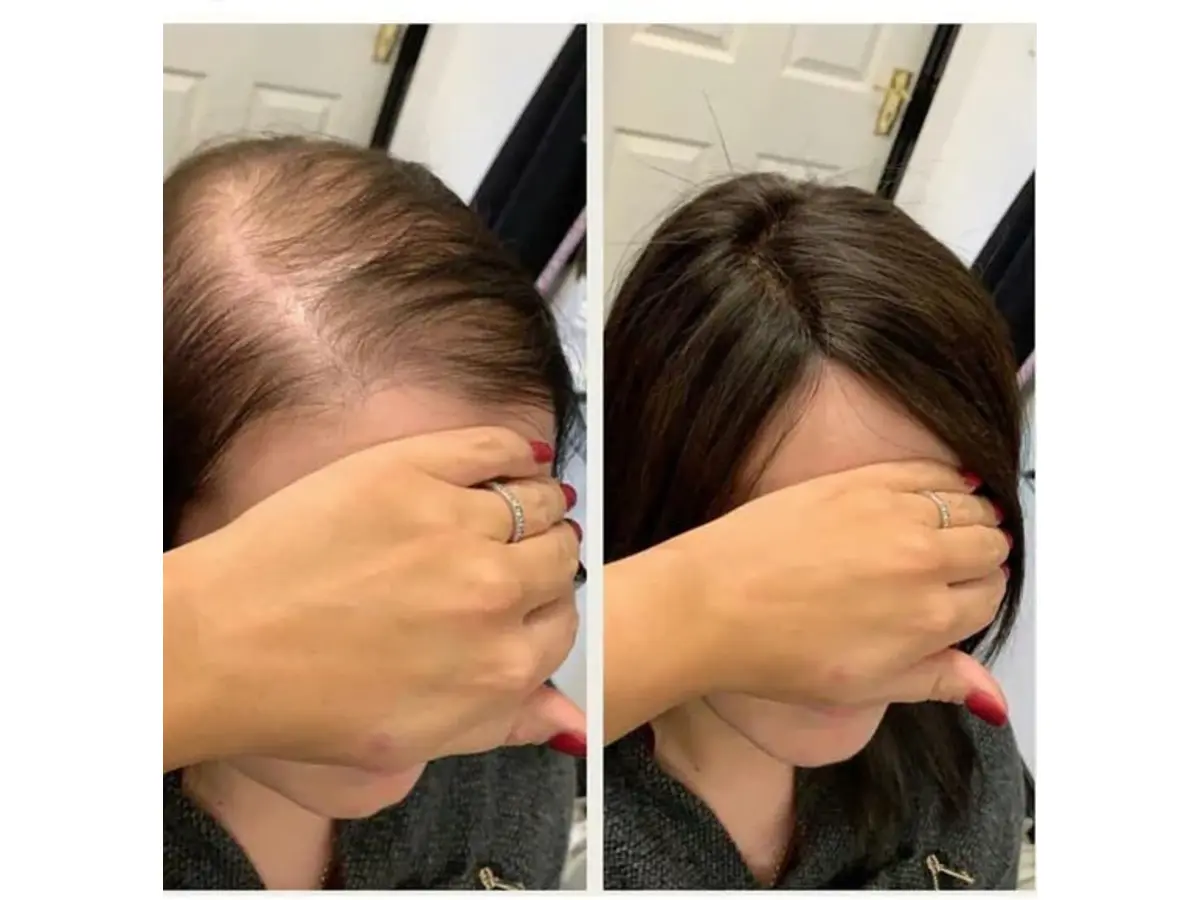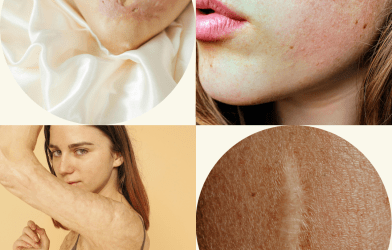Table of Contents
Fatest Way to Regrow Hair Naturally
Fastest Way to Regrow Hair Naturally in just 3 Weeks. Hair regrowth can be a concern for many individuals experiencing hair loss due to various factors such as genetics, stress, or medical conditions. Fortunately, several methods and treatments are available to stimulate hair regrowth and improve hair health. These include topical treatments like minoxidil, which stimulates hair follicles, and oral medications such as finasteride that can prevent hair loss by inhibiting DHT production.
Additionally, lifestyle changes like maintaining a balanced diet rich in vitamins and minerals, reducing stress, and avoiding excessive use of heat and chemical treatments on hair can also contribute to healthier hair regrowth. For those seeking more advanced solutions, therapies such as laser treatment and hair transplant surgery are options worth considering under professional guidance.
How we can Check Hair Growth is Normal?
Monitoring the growth of our hair is essential to ensure that it remains healthy and grows at a normal rate. Typically, hair grows about half an inch per month, but this can vary based on factors like genetics, age, and overall health. One method to check if your hair growth is normal is to track the length of your hair over a few months by using a ruler or a hair-length chart.
Observing the health of your scalp and hair strands can be indicative; healthy hair should feel strong and have minimal breakage. Regularly checking for any signs of unusual hair loss or thinning, which might suggest an underlying health issue, can also be helpful. For more detailed assessments, consulting with a healthcare provider or a dermatologist can provide personalized insights into your hair growth patterns.
It is important to note that not all hair loss or thinning is abnormal. It is normal for people to lose 50-100 hairs per day as part of the natural hair growth cycle. However, if you notice excessive shedding or sudden changes in your hair thickness, it may be a cause for concern and should be addressed with a medical professional.
To monitoring the physical aspects of hair growth, paying attention to our overall health and lifestyle can also impact the rate at which our hair grows. A balanced diet rich in vitamins and nutrients, regular exercise, and stress management are all essential for maintaining healthy hair growth.
Benefits to Regrow Hair Naturally
Regrowing hair at home offers several benefits that can be both convenient and cost-effective. Firstly, undertaking hair regrowth treatments in the comfort of your own home allows for a flexible schedule, giving you the freedom to apply treatments at a time that suits you best. This convenience is particularly beneficial for those with busy lifestyles or limited access to specialised clinics.
Furthermore, home remedies and over-the-counter treatments typically come at a fraction of the cost of professional procedures, making them accessible to a wider audience. Additionally, regrowing hair at home provides the opportunity to use natural remedies, which often have fewer side effects compared to chemical treatments. This holistic approach not only targets hair growth but also promotes overall scalp health, resulting in stronger and healthier hair. With the abundance of information and resources available online, it is easier than ever to research and find effective home remedies for hair regrowth.
One of the most common causes of hair loss is genetics. However, factors such as stress, diet, and hormonal imbalances can also contribute to hair thinning and balding. By addressing these underlying issues through natural home remedies, not only can you stimulate hair growth but also prevent further hair loss. For example, incorporating a balanced diet rich in vitamins and minerals essential for hair health, along with scalp massages using essential oils or herbal supplements can promote blood circulation and nourish the scalp.
Case Studies of Hair Regrow in a Month Naturally at Home
Case Study 1: Amna’s Journey with Essential Oils
Amna, a 35-year-old marketing executive, experienced significant hair thinning due to chronic stress and a hectic work-life balance. After extensive research, she decided to try a homemade remedy involving essential oils. Every week, Amna applied a mixture of rosemary, lavender, and peppermint oils, massaging it gently into her scalp. Alongside this, she maintained a diet rich in omega-3 fatty acids, vitamins A and C, and biotin. Within three months, Amna began noticing a marked improvement in hair thickness and overall scalp health. She reported a 40% reduction in hair fall and a noticeable increase in new hair growth, attributing her success to the consistent use of natural oils and a nutrient-rich diet.
Case Study 2: Ali’s Success with Herbal Supplements
Ali, a 40-year-old teacher, confronted male pattern baldness that greatly affected his confidence. Skeptical of chemical treatments, he turned to herbal supplements and home remedies. Ali incorporated saw palmetto and ginseng supplements into his daily routine, known for their hair growth-promoting properties. Additionally, he regularly applied a homemade mask of aloe vera and coconut oil to his scalp. After six months, Ali saw a substantial improvement in his hair density and reported a decrease in receding hairline issues. His colleagues and family noticed the positive change, boosting his self-esteem significantly.
Case Study 3: Hina’s Transformation with Nutrient-Rich Diet
Hina, a 28-year-old graphic designer, faced severe hair thinning due to poor dietary habits and hormonal imbalances. She decided to overhaul her diet by incorporating foods rich in iron, zinc, and vitamins D and E. Hina also started using a DIY hair mask made from fenugreek seeds and yogurt, applying it twice a week. Over a span of four months, Hina observed a dramatic reduction in hair fall and a considerable growth of new hair strands. Her commitment to a nutrient-rich diet and regular application of home remedies led to healthier, thicker hair and overall better scalp health.
These case studies highlight the potential of natural, home-based treatments for effective hair regrowth. With dedication and the right approach, many individuals can achieve remarkable results in the comfort of their own homes.
Mechanism of Hair Regrow
Understanding the mechanism of hair regrowth is essential for effectively combating hair loss and promoting healthier hair. Hair growth occurs in cycles, encompassing the anagen (growth), catagen (transitional), and telogen (resting) phases. The anagen phase, which determines hair length, is characterized by active cell division in the hair follicles, leading to the formation of new hair strands. This phase can last from two to six years, depending on genetic factors.
During the catagen phase, the hair follicle enters a brief period of regression, where growth ceases, and the hair follicle shrinks. This stage usually lasts for about two weeks. Subsequently, the hair enters the telogen phase, a resting period that lasts around three months. At the end of the telogen phase, the old hair is shed, and a new anagen phase begins, restarting the cycle.
Various factors influence these phases, including genetics, hormonal balance, and external factors like diet and stress. For instance, hormones such as dihydrotestosterone (DHT)can shorten the anagen phase, leading to hair thinning and baldness. Conversely, a nutrient-rich diet and proper scalp care can foster a conducive environment for prolonged anagen phases, enhancing hair growth.
Effective hair regrowth treatments typically aim to extend the anagen phase, stimulate follicular activity, and ensure optimal scalp health. Natural remedies like essential oils and dietary supplements can support these goals by improving blood circulation, delivering vital nutrients, and maintaining hormonal balance. By comprehending these underlying mechanisms, individuals can tailor their hair care routines to promote robust and sustained hair growth.
Importance of Hair for our Scalp
Hair plays a vital role in protecting and maintaining the health of our scalp. Beyond its aesthetic value, hair acts as a natural barrier that shields the scalp from harmful environmental factors such as UV radiation, pollution, and physical abrasions. This protective layer helps prevent damage to the scalp’s delicate skin, reducing the risk of conditions like sunburn, irritation, and infections.
Furthermore, hair aids in the regulation of scalp temperature. Acting as an insulator, it conserves heat during colder weather while providing ventilation and cooling through the evaporation of sweat in warmer conditions. This thermoregulatory function is essential for maintaining a balanced and healthy scalp environment.
Moreover, the presence of hair also contributes to the sensory perception of the scalp. Hair follicles are surrounded by nerve endings that send signals to the brain in response to tactile stimuli. This sensitivity can alert individuals to potential scalp issues, enabling early detection and treatment of problems such as dryness, inflammation, or parasitic infections.
Hair is not just an aspect of personal appearance but an essential component in safeguarding and promoting scalp health. Understanding the multifaceted roles of hair can underscore its importance in comprehensive hair care routines aimed at preserving both hair and scalp well-being.
Tips to Regrow Hair at Home
- Consistency is Key: One of the most crucial factors in successful hair regrowth is maintaining a consistent routine. Whether you are applying essential oils, herbal supplements, or homemade masks, sticking to your regimen without interruptions will lead to the best results.
- Understand Your Hair Type: Different hair types may require different approaches. For example, oily scalps may benefit from tea tree oil, which has natural astringent properties, while dry scalps might respond better to the moisturizing effects of coconut oil. Knowing your hair type can help you tailor your treatments more effectively.
- Balanced Diet: A diet rich in essential vitamins and minerals, such as iron, zinc, biotin, and omega-3 fatty acids, can make a significant difference in hair health. Incorporate plenty of fruits, vegetables, nuts, and fish into your meals for overall nourishment.
- Hydration: Proper hydration is vital for maintaining healthy hair. Drinking adequate water ensures that your scalp stays hydrated, which in turn promotes healthier hair growth.
- Scalp Care: Regular scalp massages can improve blood circulation, which helps in delivering essential nutrients to hair follicles. Consider using oils like rosemary, peppermint, or lavender for added benefits.
- Avoid Harsh Chemicals: Stay away from hair products that contain sulfates, parabens, and other harsh chemicals which can damage hair and inhibit growth. Opt for natural or organic products whenever possible.
- Manage Stress: High stress levels can contribute to hair loss. Practice stress-reducing activities like yoga, meditation, or regular exercise to keep your stress in check and promote better hair health.
By incorporating these tips into your daily routine, you can enhance the effectiveness of your home remedies and work towards healthier, fuller hair.
Best Natural Remedies to Regrow Hair in a Month
| Remedies | Benefits |
| Massage | Scalp massage is an often overlooked but powerful tool in the quest for hair regrowth. By stimulating blood circulation in the scalp, massage ensures that hair follicles receive a steady supply of essential nutrients and oxygen, both of which are crucial for healthy hair growth. Improved blood flow not only enhances the delivery of these vital nutrients but also helps to expel waste products from the scalp, creating a more conducive environment for hair to thrive. |
| Onion Juice | Onion is heralded as a potent natural remedy for hair regrowth due to its rich sulfur content. Sulfur is a key component in the formation of keratin, a protein that constitutes hair strands, enhancing their strength, thickness, and growth. When applied to the scalp, onion juice can boost blood circulation in the hair follicles, ensuring the delivery of essential nutrients and oxygen. This nourishes the follicles and stimulates hair growth. |
| Ginger Juice | Ginger, known for its myriad medicinal properties, is also highly regarded for its potential to aid in hair regrowth. Ginger contains active compounds such as gingerol, which possess antioxidant and anti-inflammatory properties, helping to combat oxidative stress and inflammation that can impair hair growth. These compounds can enhance blood circulation in the scalp, facilitating the delivery of essential nutrients and oxygen to hair follicles, thus promoting healthy hair growth. |
| Garlic Juice | Garlic is revered in the realm of natural remedies for its potential to stimulate hair regrowth and combat hair loss. Packed with sulfur and selenium, garlic contributes to the formation of keratin, the protein that makes up hair strands, thereby strengthening the hair and promoting healthy growth. The natural compounds in garlic improve blood circulation when applied to the scalp, ensuring that hair follicles receive an adequate supply of nutrients and oxygen needed for hair development. |
| Fenugreek Seeds | Fenugreek, a staple in traditional medicine, is celebrated for its potential to aid in hair regrowth and combat hair loss. Rich in proteins and nicotinic acid, fenugreek seeds provide crucial nutrients that support hair health. The proteins help to strengthen hair shafts, reducing brittle hair and breakage, while the nicotinic acid enhances blood circulation to the scalp, ensuring hair follicles receive the nourishment they need to thrive. |
| Clove Water | Clove water has emerged as a potent natural remedy for promoting hair regrowth and managing hair loss. Cloves are rich in essential nutrients such as vitamins A, C, and K, along with minerals like iron, potassium, and manganese, which are vital for maintaining healthy hair. The high antioxidant content in cloves helps in fighting free radicals, protecting hair follicles from damage, and promoting a healthy scalp environment conducive to hair growth. Additionally, cloves contain eugenol, a compound known for its antifungal and anti-inflammatory properties, which can help to alleviate scalp issues such as dandruff and irritation, further encouraging hair regrowth. |
| Coconut Oil | Coconut oil has long been hailed as a miracle ingredient in hair care, particularly for its potential to promote hair regrowth and reduce hair loss. Rich in essential fatty acids and vitamins, coconut oil deeply nourishes the hair and scalp, providing the necessary nutrients to promote healthy hair growth. The lauric acid in coconut oil, in particular, has been shown to penetrate the hair shaft easily, reducing protein loss and strengthening the hair from root to tip. |
| Lemon Juice | Lemon juice is another effective natural remedy that can aid in hair regrowth and overall hair health. Rich in vitamin C and antioxidants, lemon juice promotes the production of collagen, a vital protein that helps in the creation of new hair cells and strengthens existing hair. The acidic nature of lemon juice helps to exfoliate the scalp, removing dead skin cells, dirt, and product buildup that can clog hair follicles and hinder hair growth. |
| Tea Tree Oil | Tea tree oil is a powerful essential oil that has gained recognition for its ability to support hair regrowth and improve overall scalp health. Extracted from the leaves of the Melaleuca alternifolia plant, tea tree oil boasts a wealth of antibacterial, antifungal, and anti-inflammatory properties that can significantly benefit the scalp and hair. One of the fundamental ways tea tree oil aids in hair regrowth is by addressing scalp issues that can impede hair growth. Conditions such as dandruff, scalp inflammation, and clogged hair follicles are often major contributors to hair thinning and loss. Tea tree oil helps to cleanse the scalp by removing impurities and excess oils, preventing the buildup of products and debris that can block hair follicles. |
| Apple Cider Vinegar | Apple cider vinegar (ACV) is a versatile natural remedy that has garnered attention for its potential to promote hair regrowth and address hair loss. One of the primary benefits of ACV lies in its ability to maintain the scalp’s pH balance. A balanced scalp pH is essential for creating an optimal environment for hair regrowth, as it helps to keep the scalp clean and healthy. Furthermore, ACV possesses potent antibacterial and antifungal properties, which can help in combating scalp infections and dandruff, both of which can hinder hair growth. |
| Rosemerry Oil | Rosemary oil is a widely acclaimed natural remedy known for its ability to promote hair regrowth and enhance overall hair health. Extracted from the aromatic herb Rosmarinus officinalis, this essential oil is rich in antioxidants, anti-inflammatory compounds, and a unique blend of nutrients that stimulate hair follicles and improve scalp condition. One of the primary ways rosemary oil supports hair regrowth is through its ability to improve blood circulation to the scalp. Enhanced blood flow ensures that hair follicles receive an adequate supply of oxygen and essential nutrients, which are crucial for healthy hair growth. By reinvigorating dormant hair follicles, rosemary oil can help to increase hair density and thickness over time. |
Takeway
When seeking the fastest way to regrow hair at home, the integration of natural remedies such as lemon juice, tea tree oil, and rosemary oil into your hair care routine can yield remarkable results. Each of these ingredients offers unique benefits that address various aspects of scalp health and hair growth.
By consistently incorporating treatments like lemon juice for scalp stimulation, tea tree oil for cleansing and anti-inflammatory effects, and rosemary oil for enhancing blood circulation and combating hair loss hormones, you can create a comprehensive approach to promoting hair regrowth. Regular application and patience are key, as natural methods may take time to manifest visible improvements, but the overall health benefits for your hair and scalp make it a worthwhile endeavor.
FAQs about Hair Regrowth at Home
How long does it take to see results from natural hair regrowth remedies?
It takes time to see visible results from natural hair regrowth remedies can vary from person to person. Typically, with consistent application, you might start to notice improvements within 3 to 6 months. Patience and regular use are essential as natural remedies tend to show gradual progress.
Can I use lemon juice, tea tree oil, and rosemary oil together?
Yes, you can incorporate lemon juice, tea tree oil, and rosemary oil into your hair care routine, but it’s best to use them on different days to avoid any potential irritation. For instance, you can use lemon juice one day, tea tree oil another day, and rosemary oil on yet another day to give your scalp a balanced regimen.
Are there any side effects to using these natural remedies?
While natural remedies like lemon juice, tea tree oil, and rosemary oil are generally safe, some individuals may experience irritation or allergic reactions. It is advisable to perform a patch test before using any new ingredient on your scalp. If you experience any redness, itching, or discomfort, discontinue use immediately and consult a healthcare professional.
How often should I apply these natural remedies to my scalp?
For optimal results, natural remedies such as lemon juice, tea tree oil, and rosemary oil can be applied 1-2 times per week. Overuse may cause scalp irritation, so it’s important to follow recommended guidelines and listen to your scalp’s needs.
Do I need to dilute these essential oils before using them?
Yes, it is crucial to dilute essential oils like tea tree oil and rosemary oil with a carrier oil (e.g., coconut oil, olive oil, jojoba oil) before applying them to your scalp. This helps prevent irritation and ensures safe application. A common dilution ratio is to mix a few drops of essential oil with one tablespoon of carrier oil.
Can Home Remedies Helps to Regrow Hair Naturally in 3 Weeks?
Regrowing hair with home remedies in just 3 weeks is an ambitious goal, as natural treatments typically require more time to show significant results. Hair growth is a gradual process, and while some individuals may see early signs of improvement within a few weeks, noticeable regrowth usually takes longer.

















